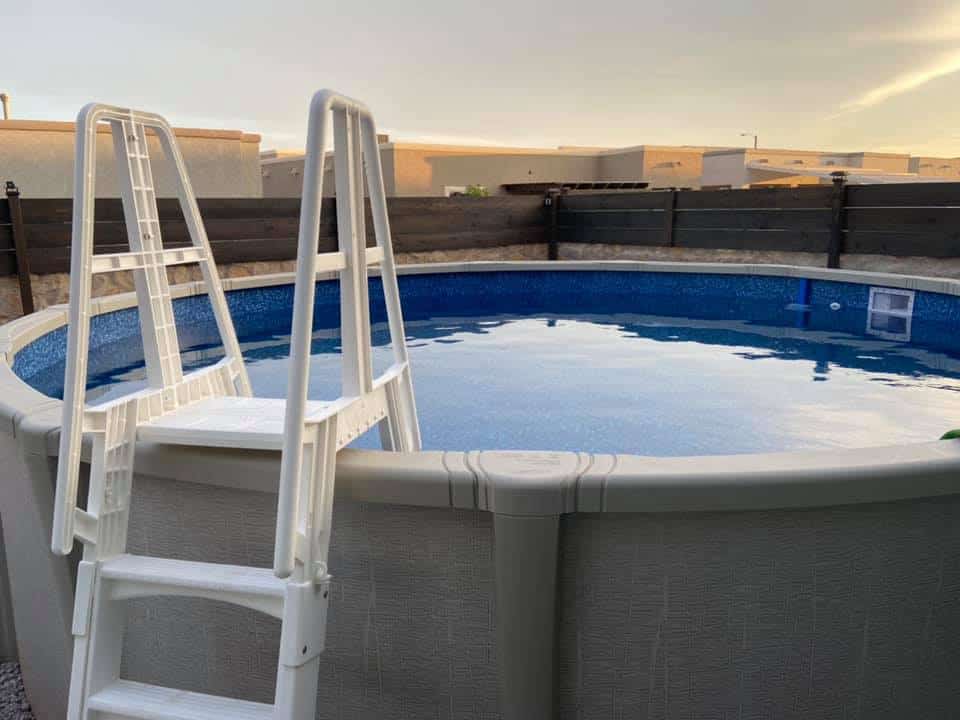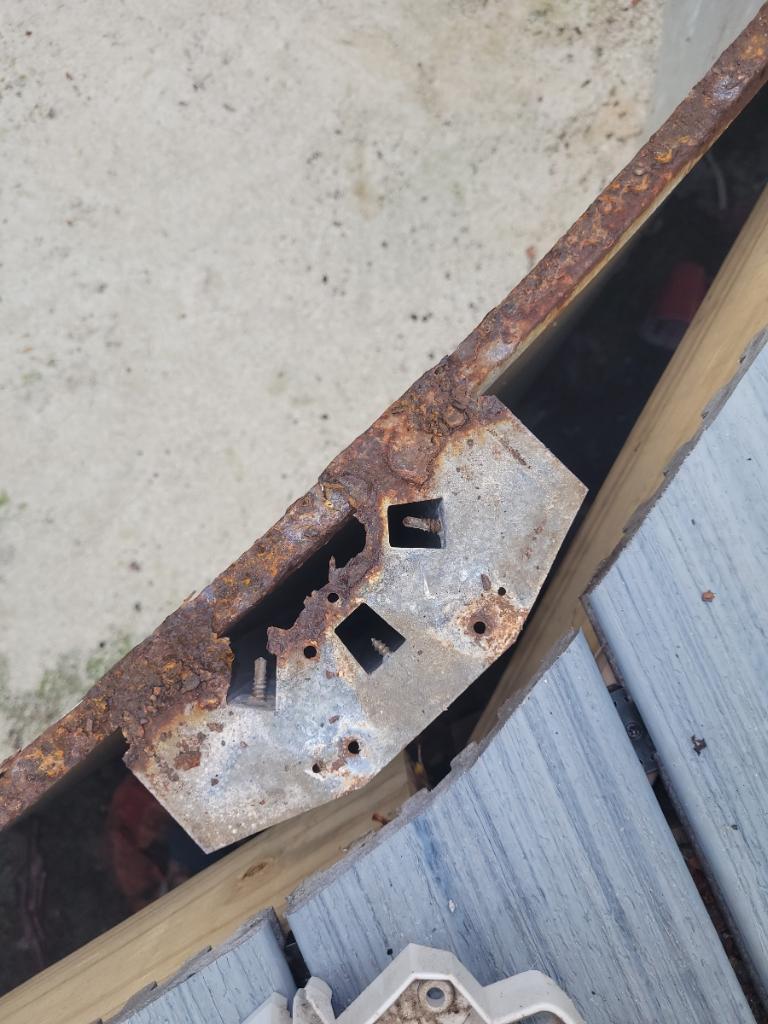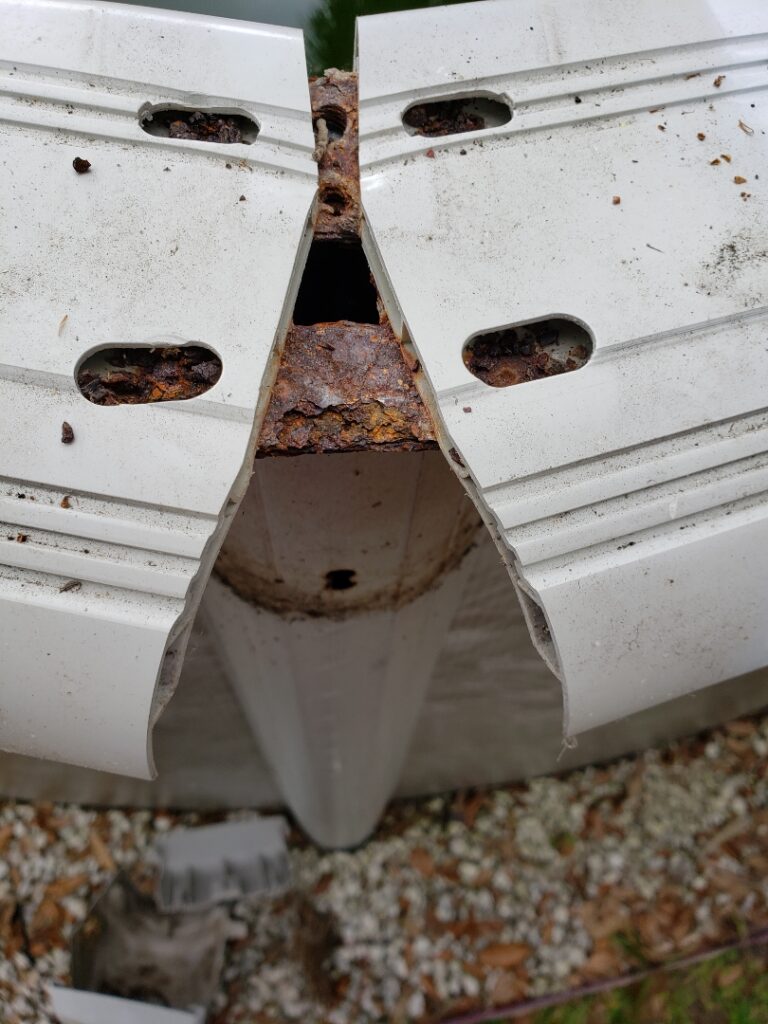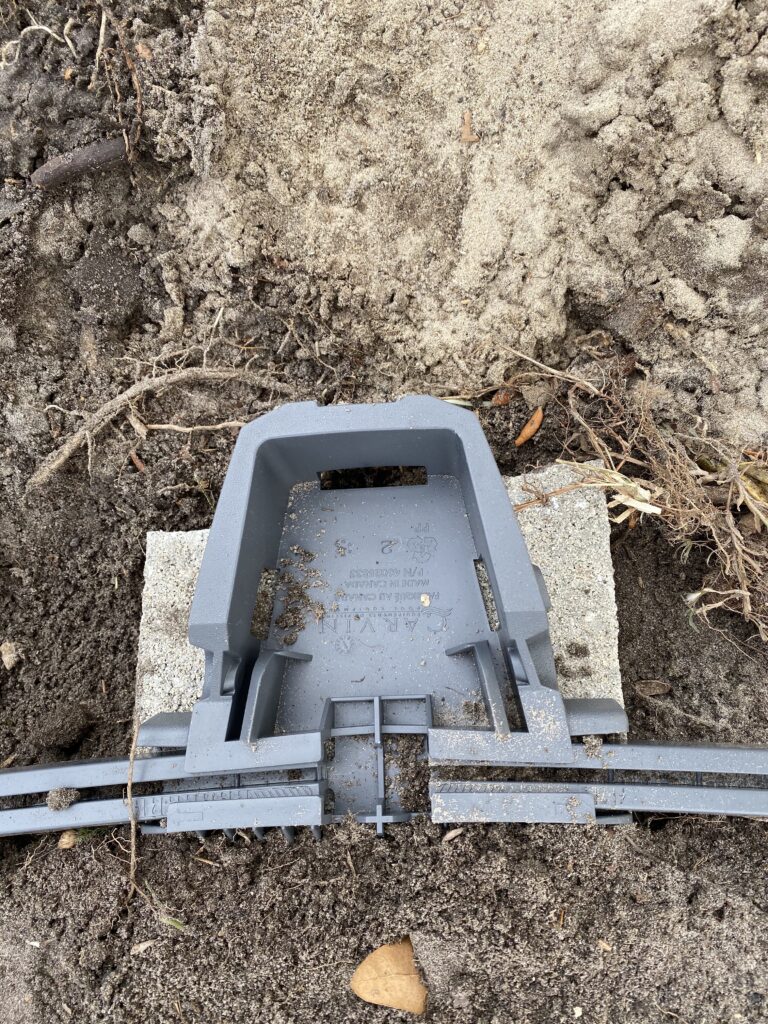
Before buying an above ground swimming pool, the average person spends a lot of time researching which one to get. One of the things they consider is if they want a salt-chlorine generator with the pool. Some call this a saltwater pool.
For the sake of this article, I’m going to assume that you know what a salt-chlorine generator is and that you are familiar then with the option of having saltwater in your above ground pool. I am also going to assume that you are now researching saltwater pools and have come across the term salt water-friendly and are here to find out what that means.
An above-ground pool is considered “salt water-friendly” when its frame parts are made of resin instead of metal. Since resin doesn’t corrode, these parts cannot be harmed by potentially corrosive saltwater.
WHY DOES A POOL HAVE TO BE “SALTWATER FRIENDLY”?
Some people believe that saltwater in above ground swimming pools will cause corrosion. I don’t at all think that, but it makes logical sense and I’m tired of arguing the point. So then, I’ll just stay on topic.
Above ground pools are made from a couple of different materials. In the past, all above grounds were made from either steel or aluminum. Now, almost all of them have some parts made of resin as well.
For some who don’t know, resin is just a fancy word for plastic. Plastic sounds cheap, but resin sounds contemporary and hi-tech, so that’s why the pool industry uses the term “resin” for plastic. To make things more confusing, above ground pools with more resin parts will cost more.
To make this simple, metal parts of an above ground pool can corrode or rust while resin parts cannot. So, if you have a saltwater pool (meaning you have a salt-chlorine generator) and you think saltwater can cause rust, then you will want the pool to have more resin parts on it because resin cannot rust. This is what salt water friendly means but it’s not that easy.
NOTE: Some above ground pool manufacturers will not warranty a pool with a salt chlorine generator (salt pool) unless they consider the model “salt water friendly”. Learn more about warranties here.
THE PARTS THAT MAKE UP AN ABOVE GROUND POOL
To understand what a salt water friendly pool really means, it’s important to know the anatomy of an above ground pool. Starting from bottom to top, here’s the list:
- Bottom track
- Bottom connector plates
- Bottom caps (optional and decorative only)
- Pool wall (made only of aluminum or steel)
- Uprights
- Wall bolts and nuts
- Top stabilizer bars
- Top connectors
- Top rails
- Connector and rail screws
- Top caps
- Liner (made only of vinyl)
When a pool is labeled salt water-friendly, it means that some of these parts are made of resin instead of metal. The wall of the pool has to be metal (although some resin walls are being experimented on as I write this), but the rest of the pool can be made from either resin, steel, or aluminum.
NOT ALL SALTWATER FRIENDLY POOLS ARE CREATED EQUAL
The actual salted water in the pool isn’t any more corrosive by contact than normal, non-salted, chlorinated pool water. And even if you believe that it is, there are parts an above ground pool that cannot come in contact with the saltwater. These parts are: the bottom track, bottom connectors, and the pool’s wall. These three parts then make no difference what material they are made of in terms of the pool being salt water-friendly.
Also, the pool’s uprights can be exposed to the water of the pool, but not much as they are on the outside of the pool wall. They can only be splashed on during some pretty extreme pool activity. So, because of this, the uprights being made of resin is only very marginally helpful in making the pool truly salt friendly.
WHICH PARTS OF THE POOL SHOULD BE MADE OF RESIN TO MAKE IT “SALTWATER FRIENDLY”

Regardless if you think saltwater causes corrosion by contact OR by the fumes generated by the chlorine, the following parts should be made of resin:
- top stabilizer bars
- top connectors
- top rails
- top caps
Saltwater or not, the parts of an above ground pool that rust or corrode from the fumes gassing off from the chlorinated water are the ones listed above. This is due to the top rails hanging slightly over the pool’s water surface which creates a pocket where air can hang out. And under the top rails, you have the stabilizer bars and top connectors in this zone where air can get trapped.
If the top rails, top connectors, and stabilizer bars are made from resin, then the trapped chlorine gas cannot do any damage. They can rust out the screws if there are not stainless, but that’s not nearly as bad as all of those parts rusting out.
SALTWATER FRIENDLY POOLS THAT ARE NOT SO FRIENDLY
I have seen all kinds of pools sold as salt friendly. A retailer who doesn’t really know what they are talking about can sell a pool model as salt friendly with a resin bottom track and steel top stabilizer bars and steel top connectors. Most SWF pools will at least have the top rails be made of resin, but in order to really be a friend of the saltwater, the entire top part of the pool should be made of resin parts and have stainless steel screws.
ALL RESIN ABOVE GROUND POOLS
There are a couple of pool models out there that are made entirely of resin. This excludes the wall and the liner but everything else plastic (oh sorry, resin).
I must throw some words of caution with the “all resin” pool. This doesn’t mean that the pool is necessary a good quality one. Some, like the Matrix by Wilbar, is totally resin and high quality, but there are also some made from overseas (not made in North America) that are very poor quality.
NOT ALL RESIN POOLS ARE CREATED EQUAL

Not all resin is the same. Some of it is rigid, thick, and stylish. Other resin is brittle, bendy, and ugly. You get what you pay for, so be aware of how much all resin pools cost. If you have done your homework and a certain pool seems too good to be true, well then, I don’t really have to finish that statement. Do I?
A good example of this is the Mighty Sun pools made in Japan. These pools cost a bit less than ones made in North America (US and Canada), but look the same and have the same specs.
The resin parts made for Mighty Sun pools are not as good quality though. If you did a side by side comparison, you would see that the Japanese resin parts are lighter and flimsier than the North American ones.
This was proven to me several years ago when I was building mostly Wilbar models from a large retailer. One of the models had resin top rails and after installing the same model for a couple of years, I got the know it very well. One day, I built that model and noticed that the resin top rails weren’t as thick or rigid as they normally were. After building a dozen or so more of them, I noticed that they now had top rails that were not as good as they used to be.
I then found out from a close friend who was high up for the retailer (Recreational Factory Warehouse btw) that Wilbar was now buying those top rails for that model from Japan. That made sense as they were not as good.
THE BOTTOM LINE ON SALTWATER FRIENDLY ABOVE GROUND POOLS

If you didn’t have time (of the attention span to read the above) then here are the cliff notes:
- Make sure the pool has the top rails, stabilizer bars, and the top connectors made of resin.
- Don’t worry about the wall or bottom track being made of steel. It doesn’t matter
- Resin doesn’t necessarily equal quality. Consider the price of the pool.

Thinking about buying above ground pool from academy sports. This pool will be used in my backyard at the beach. The pool cost about $700, and I would like to make it a salt water. Knowing that there is a lot of metal on the top rail, which Will eventually corrode, how long will the pool last before this happens? Given all that I have read, probably just buy a new one in a few years. Ideas on the longevity would be appreciated. Thank you for your articles and All of your helpful information.
The average life span of a soft-sided pool is 1-3 years. https://abovegroundpoolsknowitall.com/how-long-does-an-above-ground-swimming-pool-really-last/
Dan,
Are you familiar with the Pool Factory Saltwater LX Round Pool, I tried looking to compare your cliff notes as far as what parts are actually resin and should be. Wish I could send a pic of what pool factory is telling me they are resin.
Yes I am. They go together well. Don’t remember though if all of the top parts of that model are resin. You will have to call PF and hopefully get someone who knows on the phone.
Thanks so much for this write, super helpful! We ordered a pool that is being delivered and installed on 6/16, it is salt water compatible, we were just going to do chlorine. Then last week I thought, why not do salt, so I switched yesterday, then of course, I saw a post on FB where someone’s pool rusted because of salt, so I thought I should change back, until I read this! I’m double checking the must be resin parts from your list, I’m almost 100% sure its plastic, I mean resin! Thanks again. I’m also checking the manufacturer.